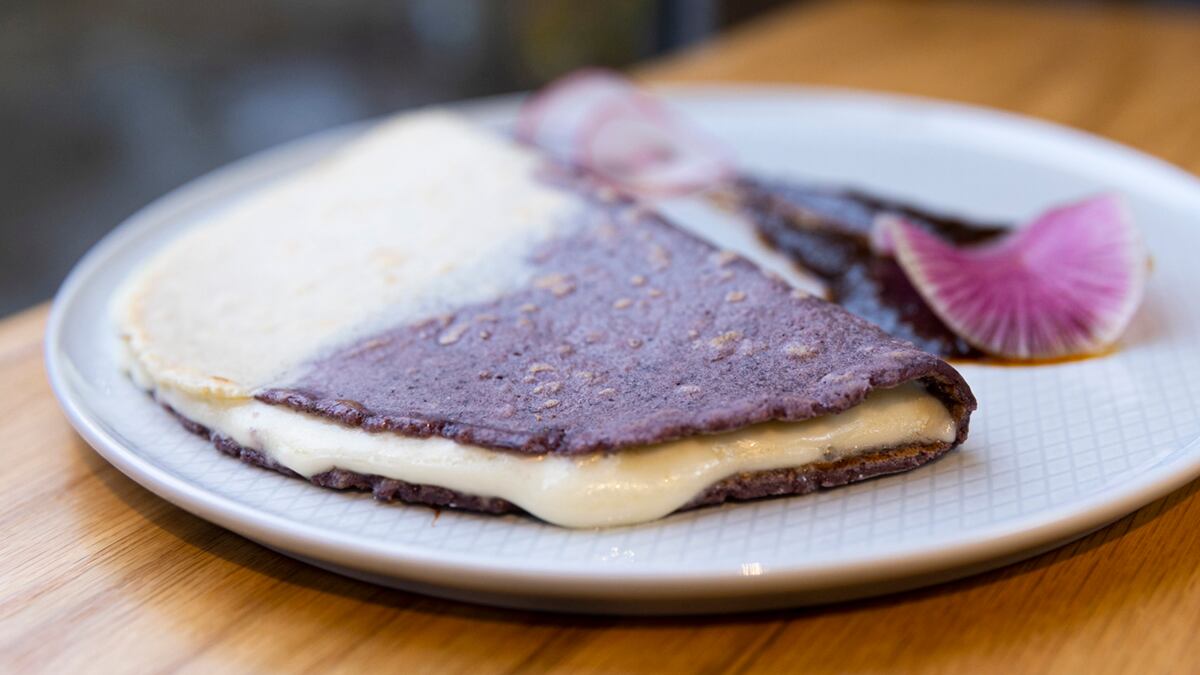Before the current COVID-19 "freeze," any restaurant was just happy to have customers. But when Angel Medina began doing food pop-ups at La Perlita, his Pearl District coffee shop, he was also thrilled by who was actually lining up outside the Ecotrust Building in Northwest for tortas, quesadillas and pastries, all made by BIPOC and/or women cooks.
"I've been in Portland for 10 years, and I've never seen this many brown folks in one space for something that isn't like, the Cinco de Mayo Festival," jokes Medina, who also owns the Mexican coffee-focused Reforma Roasters. "And it's not just, like, my Mexican parents. It's young, hip Mexican Americans, Black folks, brown folks."
Now Medina's pop-up is a restaurant: República, a collaboration among Medina, torta master Lauro Romero, who's also executive chef at King Tide in the Riverplace Hotel, and Olivia Bartruff, a pastry chef and baker who started out as a teenager at Fleur de Lis.
The trio knew full well that it was bold to open a new restaurant in the middle of a pandemic. But the pop-ups showed there was demand, and the Ecotrust space that used to be a Laughing Planet was just sitting there available.
"We've been talking about this concept for quite a while now: taking food that we love without having to label it as something cliché," says Medina. "Like 'elevated Mexican cuisine.' Or 'street food,' whatever the fuck that is."
República is a casual yet ambitious place built around guisados—the stewed fillings that go in tortas and tortillas—and corn masa. Right now, República is getting its masa from Three Sisters, but aspires to mill and nixtamalize its own. It also has a not-so-secret weapon in tortilla maker Doña Chapis, who does her own quesadilla pop-ups several days a week. She previously worked at Mi Mero Mole, where you could see her pressing masa through the window facing Southwest 5th Avenue.
"What she does is just masterful," says Medina. "The first time I saw it was like everything stopped and classical music started playing in the background, with a spotlight over her."
Having opened just in time for the freeze on in-person dining, República's "De Noche" menu—with a focus on wine, specials, small plates, dessert and an elaborate cheese-and-charcuterie service—is being reassessed. But the "Platos Rotos" daytime menu—tortas, guisados and soups—remains as is, and it's already been doing nighttime takeout specials.
But when in-person dining is available again, República's founders want the place to feel like home. "The vibe that we wanted to create was that it should always feel like you're going to your friend's house in some part of Mexico," says Medina. "And if you know my culture, and the way we are, we constantly feed you."
Here are four of República's signature dishes:

Torta de Cochinita ($15)
The classic Yucatan guisado—pork marinated in achiote and sour orange, slow-cooked in banana leaf—comes on a telera roll from Panaderia Mexicana Cinco de Mayo. "A good telera needs to be kind of crunchy on the outside, but really soft in the middle," Romero says.
The meat is layered on the roll with refried black beans, pickled onion, habanero pepper and avocado. The torta is then finished with a little butter on a panini press, just like at Romero's favorite shop next to his old elementary school in Tulancingo. "I still go there every time I go back home," he says. "It does something different to the sandwich."

Quesadilla Oaxaqueña ($8)
A simple, yet completely elegant expression of just three ingredients: corn, cheese and salsa. A visually arresting swirl of both blue and yellow masa is pressed large and thick, put on a comal, flipped, and then folded over stretchy Queso Oaxaca from Don Froylan Creamery in Salem.
The quesadilla is served alongside red-black salsa macha, which gets its layers of flavor (and fat) from sesame seeds, peanuts, chilies, garlic and oil. "It's not very common here," says Medina. "But if you go to Oaxaca, the hot dog guy's got like ketchup, mustard and salsa macha."

Pistachio Flan Brûlée ($9)
Even to go, Bartruff's desserts are presented like fine dining, artfully arranged in the sort of delicate little plastic-lidded box you might find in a macaron shop. These molded, Mexico City-inspired flans are made with sweet pistachio butter from the Southwest food cart Duo PDX. "It's very creamy and nutty," Bartruff says. The flans are topped with a thin helmet of burnt sugar, and are accompanied by mascarpone whipped cream, pomegranate reduction and pralined pistachios.

Paste ($8)
That's pronounced PAH-stay. As in "pasty." When mining companies from the English town of Cornwall first came to Romero's home state of Hidalgo, they brought two things with them: futbol and Cornish pasties. The Mexican silver miners made the filled dough—basically the same genre as empanadas—their own, using lard and pulque (a fermented agave drink) in the crust, and their own fillings instead of the traditional meat, potato and rutabaga.
At República, Bartruff brings her "pie crust knowledge," to the recipe, adding a bit of sugar and experimenting with different beers instead of pulque. The large, flaky pastes are currently filled with whatever guisados the restaurant has on hand (pork, chicken, mushroom), but Romero also plans to try out more typical Hidalguense fillings, like chicken tinga and a sweet arroz con leche.
República, 721 NW 9th Ave., 951-206-8237, @republicapdx. 11 am-3 pm and 4-8 pm daily.
